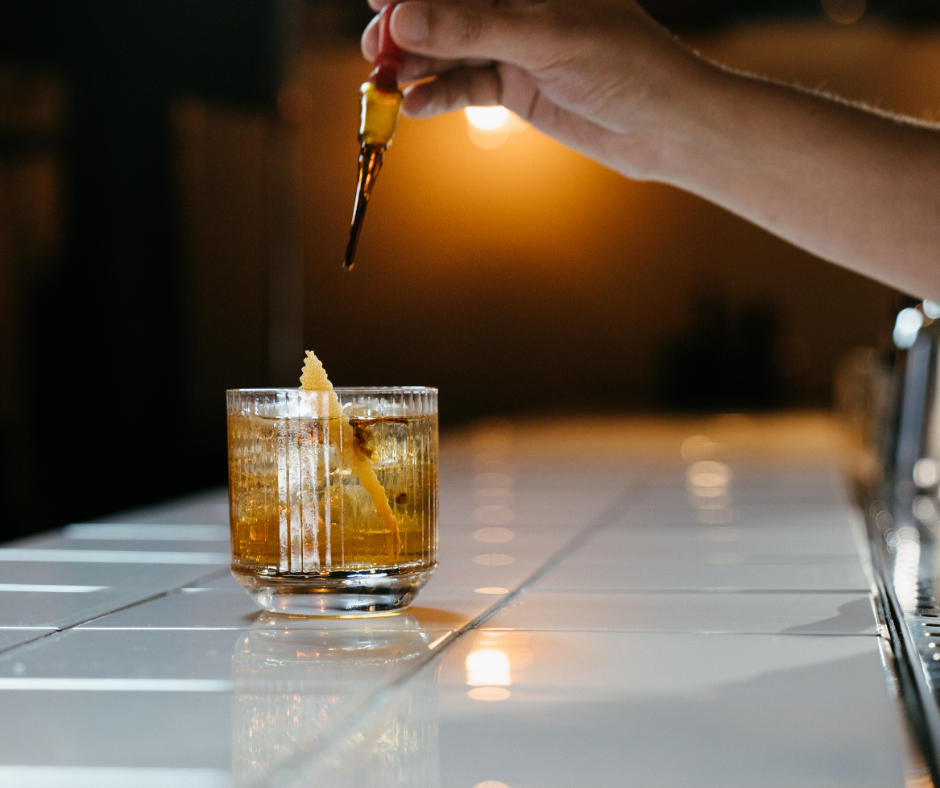Bitters make bourbon (and whiskey) better. Bitters are more than just flair for mixologists to add to cocktails. They’re a critical element of flavor, aroma and balance in many bourbon cocktails.
Bitters are essentially your spice rack for cocktails. They’re your salt and pepper. They’re often a binding agent that brings together disparate flavors or pulls out complementary flavors in foods. Not only do they balance out sweetness, but they adjust acidity in cocktails as well.
Bitters and bourbon If you’re looking to acquire a few bottles, be sure to consider how they’ll work with bourbon’s trademark flavors such as vanilla, toffee, oak, caramel, and smoke. They pair nicely with citrus and chocolate bitters, but not as well with herbal-flavors. (Bourbon and cucumber? Not and ideal match.)

Flavoring agent vs bittering agent
Bitter production often includes both flavoring and bittering agents. Bittering agents, like wild cherry bark, orris root, chincona, or wormwood impart the true bitter taste to the bitters. Think of a tea or decoction with wild bark in it. They’re terribly bitter. But each bitterness has notes of other flavors. Some bittering agents taste earthy, others sharp and medicinal, some taste chalky.
So often bitter makers will pair those base notes of bitterness with flavoring agents like
The addition of those flavoring agents adds flavor and aroma to the bitters. Those flavoring agents can signal the brain as we taste, giving us reminders of the flavor or aroma and helping the brain interpret the taste input. They often pull or accentuate latent flavors in the cocktail elements and move them to the forefront.
Generally, a combination of both will be used in the creation of bitters. For control over the final flavor, some bitters makers create tinctures of each separate ingredient and combine them to create the final product. This gives them final control of the full flavor and aroma of each batch.
On Bourbon and Bitters: History of Bitters
I’ve already described a little of the history of bitters. In their uses as medicinal tinctures, healers prescribed their consumption, often in teas or food. Once alcohol production became common, pharmacists used alcohol to extract and concentrate the medicinal qualities of the plants.
Some saloons and pharmacists touted cocktails as medicinal because they contained plant extracts, and were part of the reason a cocktail was a morning drink. You take your medicine first thing, too, don’t you?
Modern bitters started in the late 1700s to early 1800s as health cures. In Colonial times in America, they were your medicine cabinet, or your pharmacy that cured what ailed you. These extracts were invariably bitter and it’s likely some were safer than others. Some snake oil cures likely fell in this category.

JGB Siegert created Angostura bitters to cure malaria and stomach ailments for soldiers in 1824. He created them in the city Angostura in Venezuela but his formulation didn’t have angostura bark in them. Siegert was a shrewd businessman. He sued companies using angostura in their name (even though there is a bark angostura that can be used in bitters). From the history it appears he sued many other bitters companies out of business.
Another early and popular bitter originated in the US, created by Antoine Peychaud in 1838 in the French Quarter of New Orleans. He was a Haitian pharmacist who promoted the consumption of his bitters with a bit of Cognac. And that’s where we find the origin of the first Sazerac – as Peychaud created an easy tipple to make the bitters go down smoother. Today, we’ve switched from Cognac to whiskey, but Peychuad’s bitters and a tiny bit of absinthe still complete the bittered whiskey cocktail.

As the cocktail scene expanded in the late 1800s and early 1900s and alcohol consumption rose in the US, dozens of bitters were created with touted medicinal effects. Bitters were everywhere as cures and cocktail ingredients.
Sidenote: Angostura survived Prohibition, as most other bitters companies did not, by convincing the US government that the bitters were not potable and that no one in their right mind would sip bitters straight from the bottle as they would a spirit. He got away with it. He was the only U.S. bitters company to survive Prohibition.
Like most of the rest of the spirits industry, bitters companies were decimated by Prohibition. Afterwards, only Angostura and Peychaud’s bitters were commonly found in the U.S. Until the cocktail renaissance of the early 2000s, there weren’t many bitters available in the U.S. at all.
Now, though, hundreds of bitters and bitters and small batch bitters companies are thriving here and around the world.
Cocktail Bitters & How to Use Them!
FAQ
Do you put bitters in bourbon?
What bitters go well with whiskey?
What alcohol is best for bitters?
Do Bitters work with Bourbon?
Bitters work well with bourbon, such a sweet spirit, because they can tame that sweetness. When you taste bourbon and find those sweet vanilla, corn, caramel, fruit or nut notes, you can balance that with bitters. Think of taste as a balancing scale. In a cocktail, you want a drink that’s not too sweet and not too sour.
What is the healthier substitute of Bourbon?
Bourbon is a type of American whiskey, distilled from a mash made from primarily of corn. Best non alcohol substitute for bourbon are non-alcoholic vanilla extract, peach nectar mixed with apple cider vinegar, almond extract, ginger beer, non alcoholic bourbon extract.
Do bourbon & whiskey have bitters?
In a cocktail, especially a bourbon or whiskey cocktail, bitters can be essential. Bitters create balance. Bitters work well with bourbon, such a sweet spirit, because they can tame that sweetness. When you taste bourbon and find those sweet vanilla, corn, caramel, fruit or nut notes, you can balance that with bitters.
Do whiskey cocktails need bitters?
The standard whiskey cocktails that require bitters are Old-Fashioneds, Sours, Manhattans (and their variants), and Sazeracs. Beyond those, the possibilities are endless; bitters will add layers of flavors.
